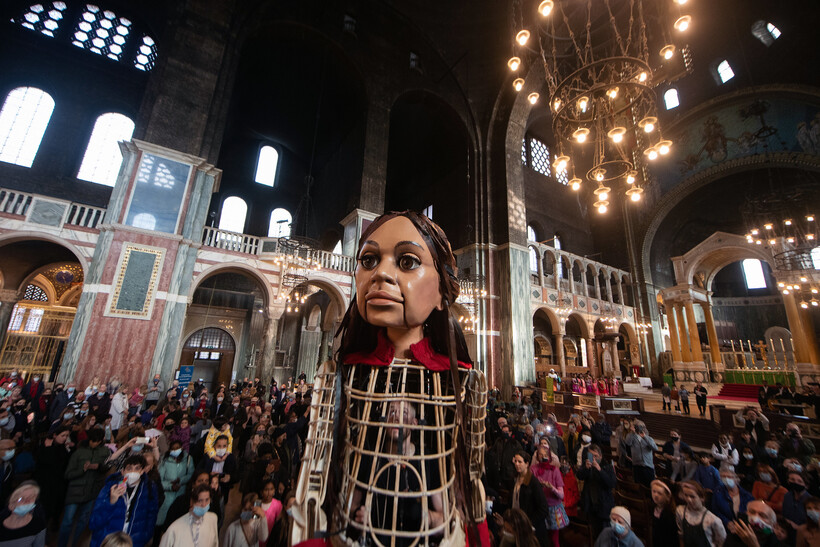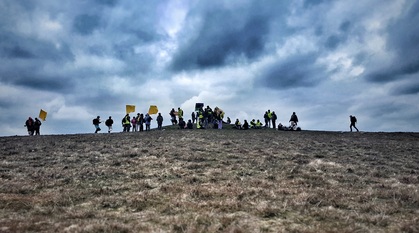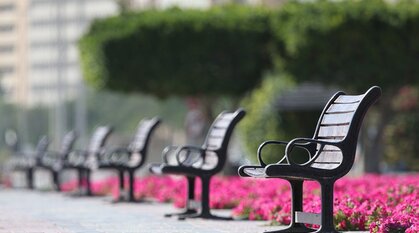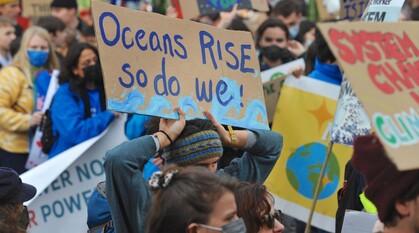Would Little Amal go to Rwanda this year?
Fred Ashmore discusses the harshening hostile environment for refugees and asylum seekers and shares what a response rooted in love and justice could look like.

Last year, many British Quakers took part in or witnessed a series of events throughout Britain in which a 3m tall puppet, Little Amal, journeyed from the Syrian border via Dover to Manchester, joining in events and rallies during her journey. Amal symbolised the search for a new life of thousands of migrants and asylum seekers. The events were inspiring and full of hope.
Little Amal's journey ended in late 2021. Since then, the UK government has passed the Nationality and Borders Act – legislation which changes the potential outcomes for those who come here full of hope. This year, 2022, Amal would be identified as a criminal because she didn't travel by one of the government's approved routes. A real life Amal could well be rejected from applying for asylum in the UK and could even be deported to Rwanda under the government's scheme.
The UK's Rwanda deportation scheme
Arrangements are already in place to export our so-called 'problems' to a country with high rates of malaria including partially drug resistant mutations and scores poorly on Transparency International's corruption index. Even after this week's intervention by the European Court of Human Rights, the government still plans to deport people to Rwanda.
The Home Office has said that no "unaccompanied minors" will be sent to Rwanda but there is already evidence of them trying to deport children, with distressing age assessments planned to prove they qualify as old enough for deportation.
Many of us believe that criminalising asylum seekers is in breach of our commitments under the 1951 Refugee Convention and in breach of human rights. It is also morally repugnant. "You asked for bread, and I gave you a stone" (Matthew 7:9). Legal challenges to try to strike down this obnoxious legislation are ongoing.
A harshening hostile environment
Since it came to power, this government, aided by sections of the media, has continued the harshening of the already hostile environment for refugees and asylum seekers. The term 'hostile environment' became part of government language in 2012, but a recent leaked report for the Home Office evaluated the implications of legislation over past decades. It found that for 30 years from 1950, every piece of legislation about immigration and asylum has been shaped to discriminate against people with black or brown skin.
I find the muted reactions to this harshening regime surprising, even in the context of other worrying developments such as the cost of living crisis and the war in the Ukraine. The government and media have successfully adopted and propagated the term 'illegal immigrant' which suggests that people who want to come to this country are threatening, dangerous, wicked. They aren't. Just desperate.
Seeking sanctuary
Illegal immigrant implies that we need a harsh, prison-based regime of detention and deportation to protect ourselves. This is despite the massive inequalities in social and economic power between most UK citizens and most migrants, and the huge affluence of this country.
The conversation around Ukrainian refugees has added a rank racist nuance to this stereotyping by suggesting that white Europeans have 'more affinity with us Britons' than people with black and brown skins. But Little Amal, still showing up at events including one in Birmingham during next week's Refugee Week, is a reminder that every person seeking a safe place is a real human being.
Acting in love
So what do love and justice require of us? Quite a lot, truly. During the recent Yearly Meeting of Quakers in Britain, we heard some startling, new and exciting messages.
For the first time, our yearly meeting has minuted that Quakers must engage seriously with the idea of financial and other reparations for our part in the wrongs of the transatlantic slave trade. And our Swarthmore Lecture, Quakers' annual public lecture (do watch it!), included a clarion call for justice in our dealings with countries of the global south, from which this country has extracted trillions of pounds sterling over the past 500 years.
Faced with this government's massive majority and the facts of the recent regressive legislation, you may feel some despair. Don't. As Minute 23 of Yearly Meeting said: "Hope is the ending and the beginning."
We can present a beacon of different behaviour and actions, starting from the decisions of Yearly Meeting, reflecting the call of the Swarthmore Lecture for justice and engaging personally in actions which will show our belief in that of God in all people. And kindness and generosity to refugees and migrants will be part of that witness.


